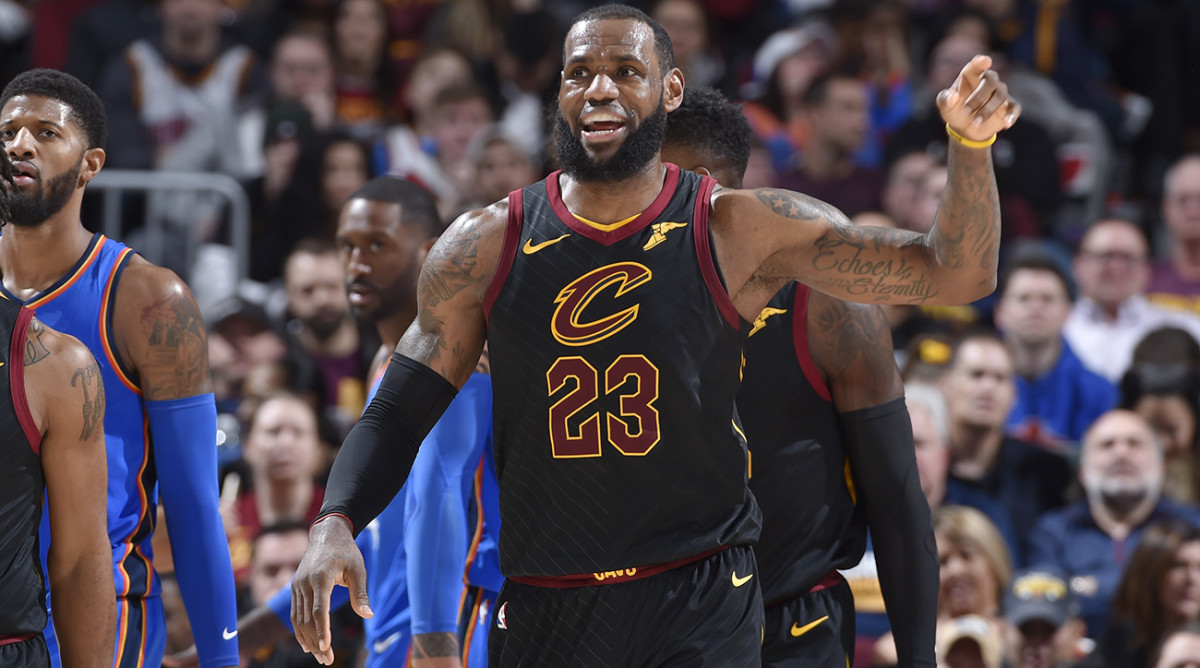The Cavs’ Future Gets Brighter as I.T.’s Timeline Gets More Depressing

There was breathtaking dysfunction on the court, a dozen anonymously sourced reports detailing fissures within the organization, endless LeBron free agency rumors, and the abrupt departures of Iman Shumpert, Dwyane Wade, Channing Frye, Isaiah Thomas, Jae Crowder, and Derrick Rose. It was maddening. It was exhausting. It was hilarious. And yet, here's what the Cavs got for Kyrie Irving in the end: George Hill, Rodney Hood, Larry Nance Jr., Jordan Clarkson and a top-10 pick.
That's not a bad deal! We live in the era of NBA teams trading superstars for pennies on the dollar, and the Cavs just managed to use the assets from the Kyrie trade to turn over half their roster. They got younger and more athletic in key places (Hood, Nance), they now have a capable starting point guard (Hill), they have a scorer off the bench who's a healthier version of the seventh man Isaiah Thomas should've been (Clarkson), and the rest of the NBA season just became a lot more interesting. None of this seemed possible as recently as Wednesday afternoon, but here we are.
Granted, there are various corners of the story that are more complicated than a simple Cavs deadline win. First of all, Isaiah Thomas. Cleveland fans—and probably Cleveland players and coaches—will not miss him. He was borderline unplayable on defense, his offense never fit next to LeBron, and in between underwhelming performances, he spent much of his time criticizing teammates, gameplans, and promising not to change his game. It was in everyone's interest to part ways. But as Isaiah moves on to Los Angeles, where there's already some dispute about what his role will be, it has to be said that the timeline here has been phenomenally depressing.
Biggest Winners and Losers From a Wild NBA Trade Deadline
For the past few years in Boston, Isaiah outplayed his contract and became the greatest bargain in the NBA. He helped build the foundation that allowed the Celtics to recruit Gordon Hayward and Al Horford, and he became so valuable that he helped net Kyrie Irving in a blockbuster trade. He's also one of the most candid athletes in any sport, basically impossible to root against, and he's just lived through nine months of personal tragedy and professional upheaval, not to mention an injury that could alter the trajectory of his career right he's due to finally hit free agency. All of this sucks. Isaiah bears some responsibility for what went wrong in Cleveland and there are weaknesses in his game that'll be magnified as his athleticism drops off, but that doesn't change the baseline of frustration with how this has played out for him. So as basketball fans celebrate the Cavs' overhaul after Thursday, there's still a somber undertone anytime anyone remembers Thomas's role in what happened.
Speaking of bad news, the Lakers. Clarkson can help Cleveland off the bench and Nance is the exactly the sort of rangy athlete who could become twice as valuable next to LeBron, so that's good. But yes: after nine of months of rumors that LeBron could go to Los Angeles, the Cavs just absorbed Clarkson's deal (worth $25 million over the next two years) and made it much easier for the Lakers to sign two max superstars this summer.

There are two ways to look at the L.A. element of this story. On the one hand, the Cavs just handed L.A. a first–round pick while also solving their biggest problem headed into free agency. Not great. On the other hand, if the Cavs think LeBron is leaving regardless, and even if they think he's going to the Lakers, they've at least been able to extract some helpful role players from the team that could potentially sign him. Even in the worst–case scenario, where LeBron goes to Los Angeles, Thursday's deal is like the CP3 trade this summer, only Cleveland keeps LeBron for another four months and gives him more help. As for the pick involved, that would hurt a lot more if the Cavs hadn't held onto the top–10 Nets pick they got for Kyrie; but they did, so surrendering the No. 25 pick in the draft doesn't sting as much.
While we're considering the potential downsides of Thursday's Cavs deals, it should be noted that all of this could fail. George Hill has been a shell of himself in Sacramento, and while the prevailing assumption is that he'll look better in a winning situation, maybe he's just old now. Rodney Hood is incredibly streaky, and his health has been an ongoing adventure for the Jazz the past few years. Nance is still largely unproven, and Clarkson is helpful, but he's just as streaky as Hood and his defense isn't much better than the players the Cavs traded away.
Most importantly, the Cavs are going to be working with a completely different team, and they've got two months to learn how to play together. This version of Cleveland is much better than the alternative Cleveland was facing—playing the next three months with a roster full of players who didn't like each other and couldn't guard the Orlando Magic—but none of these deals guarantee a title contender.
The best case for believing in the Cavs the next few months actually came Wednesday night against the Wolves. It was a game the Cavs should've won easily—Cleveland shot 59% from the field and 51% from three—but the defense was so bad that they gave up 138 points to Minnesota and went to overtime. This is how the Cavs have looked for the past six weeks. It's been a disaster. The difference against Minnesota was LeBron—as the game got close at the end, he did everything on offense, he smothered Jimmy Butler on a key defensive play late, and he hit a mind-blowing game-winner to seal it at the buzzer. It was a reminder that when he's engaged, LeBron is still the best player on the planet.
Will the Cavs' Dramatic Overhaul Save Their Season?
LeBron hasn't been engaged since Christmas. He's so good that even when he's on cruise control, he's more valuable than all but a handful of players in the league. But as the season spiraled and it became clear that the Cavs roster had fundamental problems that made a title look increasingly hopeless, LeBron became a different player. His defense has been mediocre, his offense has fallen off, and the entire team suffered. Now that improvements have been made in practically every area—seriously, this team needed the athleticism so badly—LeBron has no excuses if things fall apart. He also has a reason buy into the rest of the season, and that alone is a reason to trust the Cavs.
The sequence of the trades on Thursday was perfect. First came that Lakers deal, and for about thirty minutes Twitter became a flood of jokes about Jordan Clarkson as the new Kyrie and Dan Gilbert paving LeBron's way to L.A. This is how it always works with LeBron teams, even going back to the Heat. When things aren't working, his teams become the easiest targets in the world. So that Lakers trade was a continuation on what this season has been in Cleveland for months, a punchline that somehow got more ridiculous every day. And then those other moves fell into place. On top of Nance up front and Clarkson off the bench, the Cavs got a serviceable point guard who isn't Jose Calderon, a 25-year-old shooting guard who isn't J.R. Smith, and the entire roster began look a lot more interesting. Jokes on Twitter gave way to columns about how Cleveland is once again the favorite in the East.
It's not that the Cavs are suddenly on the same level as Golden State. They may not even make the Finals. But that's all fine. The trade deadline was just a reminder that laughing at LeBron's teams is fun for a while, but it's actually a lot more fun to watch LeBron's teams make all the critics look ridiculous. At the very least, they did it on Thursday.
